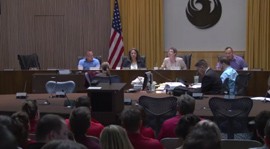Cronkite News has moved to a new home at cronkitenews.azpbs.org. Use this site to search archives from 2011 to May 2015. You can search the new site for current stories.
Bill seeks buffer between medical pot facilities and homes, schools, churches
Citing the case of a medical marijuana-cultivation facility approved for a site across a canal from homes in north Phoenix, a state lawmaker to establish a buffer.
HB 2056, authored by Rep. Bob Thorpe, R-Flagstaff, would bar facilities for cultivating medical marijuana cultivation and creating medical marijuana products within 1,000 feet of residential areas and 1,320 feet of schools and places of worship. It would apply to facilities that already exist within the limits.
Thorpe said constituents approached him when the city of Phoenix in late December approved a variance to build marijuana cultivation facility near a neighborhood. Officials pointed to a canal between the proposed facility and the nearest homes 400 feet away.
“There was no opportunity for the public to voice their concerns,” he said. “The sponsor who wanted the variance was asked to contact neighbors, and he didn’t.”
In Phoenix, owners of medical marijuana facilities must notify homeowners within 600 feet and businesses within 100 feet.
Mike McCrery, who owns a business adjacent to the proposed pot-growing facility, told the House Government and Higher Education Committee on Feb. 19 that the facility would lower property values and increase crime rates.
“We support this bill because it will not allow the municipalities and zoning officers to make these types of decisions to allow these types of facilities within 1,000 feet,” McCrery said.
The bill was awaiting a vote Thursday by the full House that would send it to the Senate.
Thorpe said the goal isn’t limiting legal marijuana cultivation.
“We just want to ensure compliance at the local level,” he said. “I like to approach things where we give local governments the greatest leeway, but this definitely turned into a problem where the local government was not even upholding their own rules.”
Medical marijuana attorney Jeffrey Kaufman said in an interview that the change would hurt the economy.
“There are not a lot of locations for growing outside residential areas,” he said. “I think it’s unfair; its intention is to restrict marijuana.”
Kaufman said he disagrees with arguments that marijuana cultivation facilities would increase crime rates and robberies.
“There have been studies in California that show that the presence of marijuana dispensaries don’t increase crime rates; it’s the same with cultivation,” Kaufman said. “It’s difficult to rob a cultivation facility. What are you going to get? It’s bulky equipment and marijuana plants that won’t last long when taken away from their growing facility.”
Chris Lindsey, legislative analyst for the Marijuana Policy Project, the group that pushed successfully for medical marijuana in Arizona, said via email that it makes sense to impose distance restrictions with schools in particular. But he said he’s seen instances in which restrictions involving other locations such as churches and residential areas create problems for businesses.
“It’s one thing to keep businesses away from schools, it’s another to simply use this issue as a way to make it hard for businesses to operate at all,” he said.
The Phoenix Board of Adjustment was to meet Thursday on a request that it reconsider granting the variance.
“Staff is aware of the proposed legislation, and in the event legislation is passed then staff will comply with any modifications to the spacing requirements,” Planning and Development Department Director Alan Stephenson said in a statement.









